#black political theory
Text
Theory Updates
Finished my second read of Blood in my Eye by George Jackson. I’m gonna do a detailed review in the coming weeks (if I finish a few thesis chapters in time :(( ). Overall a very good read, and very relevant to the mainstream fascist revival happening globally. And it also feels like a wake up call to all those on the left to stop appealing to electoralism and other types of reform, as well as a specific form of family letter to the Black Diaspora in the US. It may not really apply to Canada’s political reality (I love that Engel’s description of a ‘sleepy Canada’ still applies almost 200 years later) but I can glean from it what I will
12/10 please read it.
#fascism#george jackson#Engels#socialism#Canada#US#black diaspora#black people#black political theory#Blood in my Eye#Jackson Speaks!#left#leftism#George Jackson is a profoundly incredible man and I admire his work and the way he lived. May he rest in power.#John Jackson#Can't forget him too
6 notes
·
View notes
Text
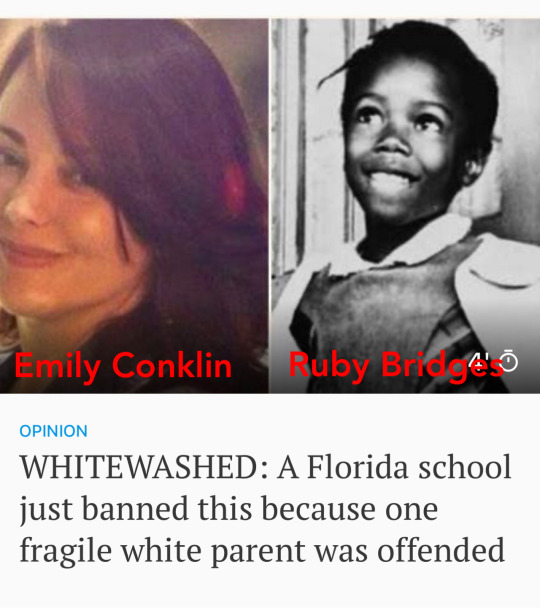
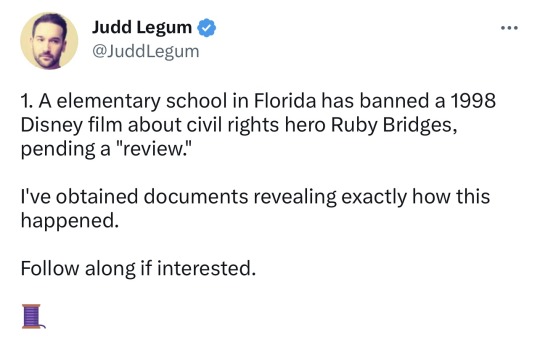
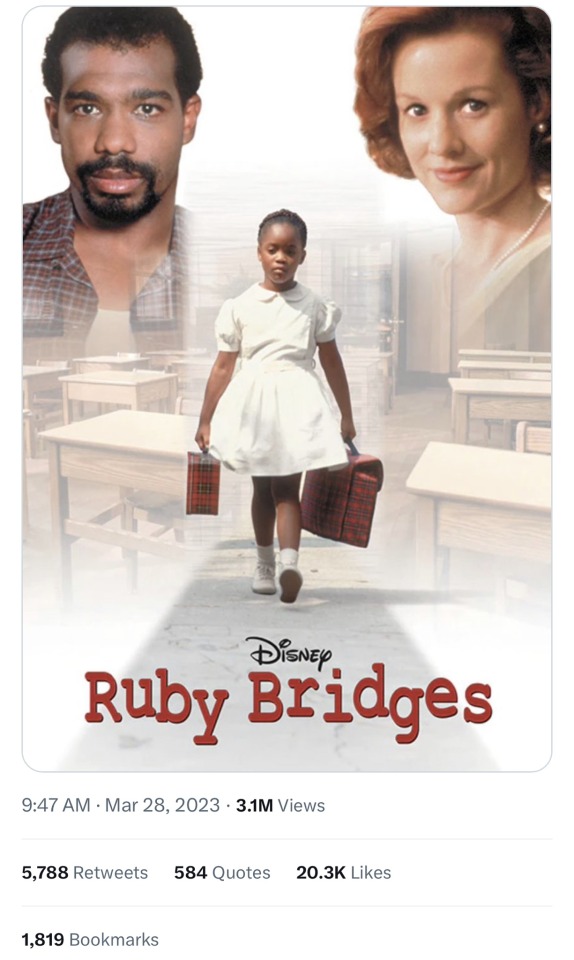
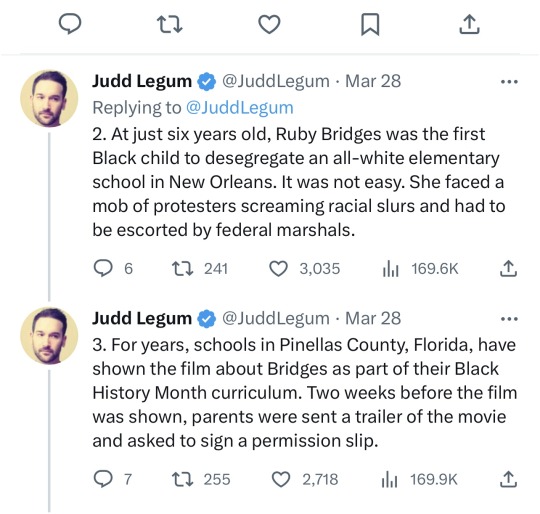
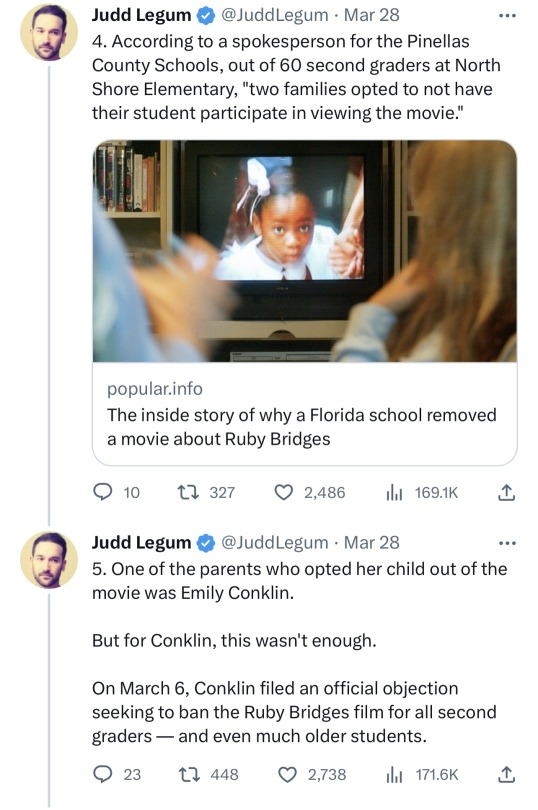
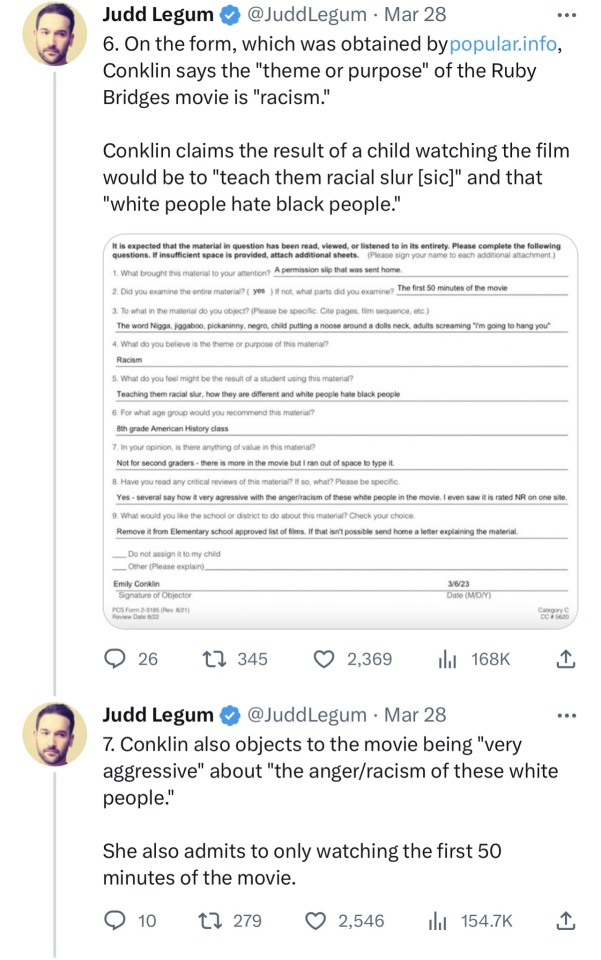
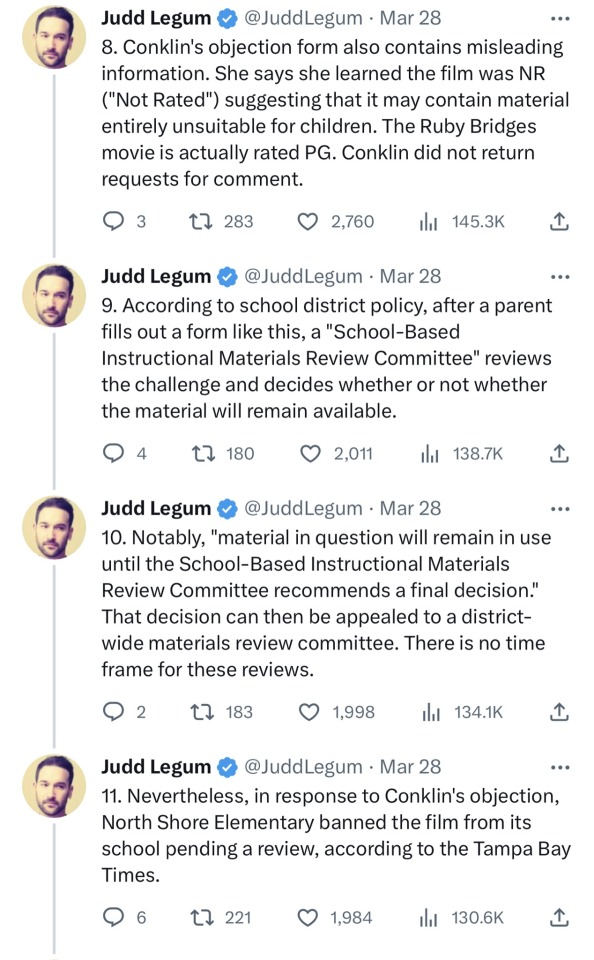
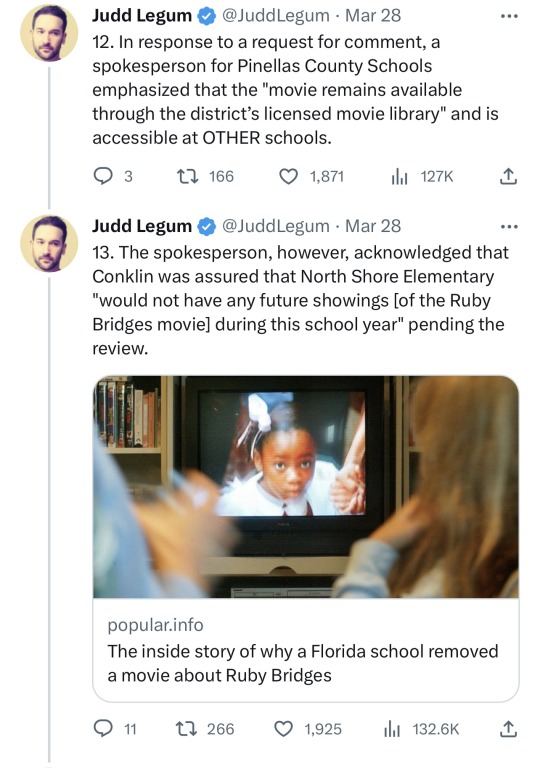
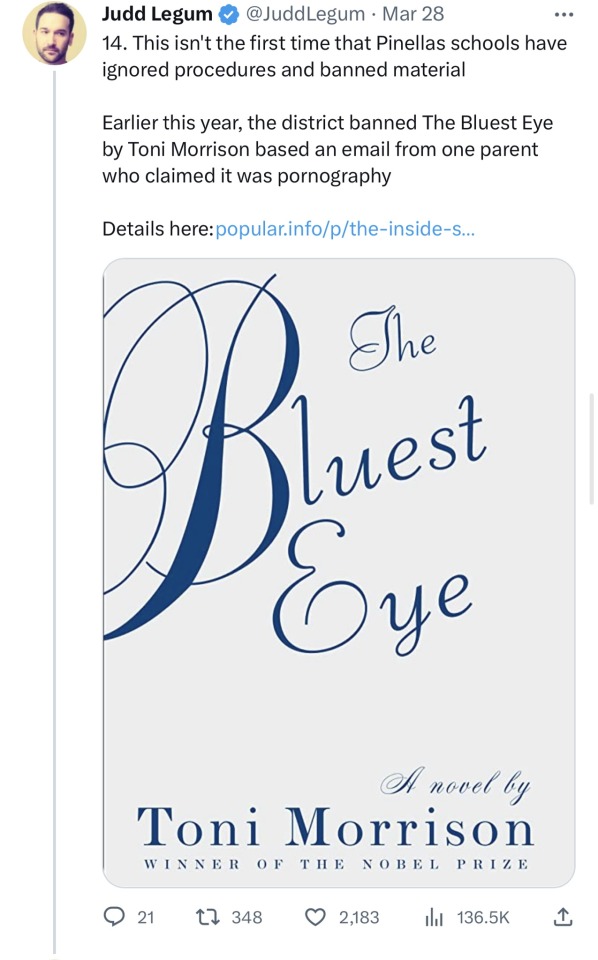
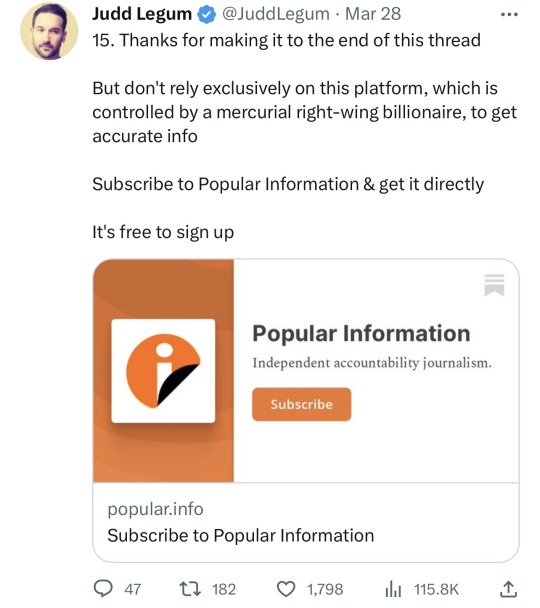
This is recent history. Ruby Bridges is 68yrs old and she is still alive.
Emily Conklin is thee definition of a racist Karen, and she is trying to whitewash the history white children learn by erasing a rated PG Disney movie that has already been shown for years in Pinellas County schools, usually as a part of Black History Month.
Two immediate thoughts that come to mind are:
“The people who threw rocks at Ruby Bridges for trying to go to school in 1960 now are upset their grandchildren might learn about them throwing rocks at Ruby Bridges for trying to go to school.”
and
“IF BLACK CHILDREN ARE OLD ENOUGH TO EXPERIENCE RACISM, WHITE CHILDREN ARE OLD ENOUGH TO LEARN ABOUT IT”
Look, Ruby Bridges was six years old when racist white parents (men and women) threw rocks and hissy fits because she was trying to get an education. A full year younger than most of the white children who are now being “protected” from learning the truth about what their grandparents did.
I guess these delicate snowflakes are so triggered by the racism of their elders that they need to get the Republican governor to whitewash away the truth.
I’m almost 40yrs old and I used to wonder how it was that in college, white kids my age genuinely believed that Martin Luther King, Jr. died of old age. But somehow, every single Black person my age knew the truth. How does that happen?? This is how it happens. This is a prime example of precisely how that happened and still happens—because to “protect” them from the truth, white kids weren’t taught that he was assassinated. It’s literally no different than raising generations of white kids to believe that 2+2=5. There’s going to be serious problems when they hit the real world. But what can I say? Conservatives like ‘em dumb and ignorant.
Anyway, this is how you get generations of fully grown white adults who truly honestly believe foolishness like “racism is over,” or “Martin Luther King basically ended racism,” or, “we don’t need affirmative action because there is no more racism; if anything it’s white people who are more discriminated against now.” (The majority of white people polled said the same thing in the 1960s too, btw).
Keeping as many white people as possible ignorant of the truth does not happen by accident. It’s very intentional. And that’s not to say that ALL white people are ignorant of the truth. Some of them, like Emily Conklin, know the truth, but just do not care.
And make no mistake: The same white people who want to keep their white children “pure” and “innocent” have ZERO problems criminalizing and sending young Black children directly to jail for even the slightest misbehavior in a classroom.
Evil, racist cowards (redundant, I know).
#politics#emily conklin#republicans#ruby bridges#whitewashing history#erasure#north shore elementary school#black history#crt#critical race theory#book banning#florida#floriduh#ron desantis
2K notes
·
View notes
Text
When parties fail, movements step up
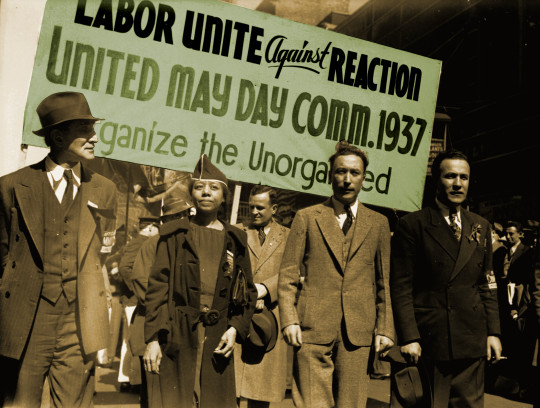
This Saturday (19 Aug), I'm appearing at the San Diego Union-Tribune Festival of Books. I'm on a 2:30PM panel called "Return From Retirement," followed by a signing:
https://www.sandiegouniontribune.com/festivalofbooks

Does anyone like the American two party system? The parties are opaque, private organizations, weak institutions that are prone to capture and corruption, and gerrymandering's "safe seats" means that the real election often takes place in the party's smoke-filled rooms, when a sure-thing candidate is selected:
https://doctorow.medium.com/weak-institutions-a26a20927b27
But there doesn't seem to be any way to fix it. For one thing, the two parties are in charge of any reform, and they're in no hurry to put themselves out of business. It's effectively impossible for a third party to gain any serious power in the USA, and that's by design. After the leftist Populists party came within a spitting distance of power in the 1890s, the Dems and Repubs got together and cooked the system, banning fusion voting and erecting other structural barriers.
The Nader and Perot campaigns were doomed from the outset, in other words. Either candidate could have been far more popular than the D and R on the ballot, and they still would have lost. It's how the deck is stacked, and to unstack it, reformers would need to take charge of at least one – and probably both – of the parties.
But that's not cause for surrender – it's a call to action. In an interview with Seymour Hersh, Thomas Frank (Listen, Liberal) sets out another locus of power, one with the potential to deliver control over the party to its base: social movements:
https://seymourhersh.substack.com/p/ordinary-people-by-the-millions
It's been done before. The parties are routinely transformed by power-shifts within their internal coalitions: since 1970, corporate Dems have consistently pushed the party to the right, making it the power of white-collar professionals and relying on working people showing up and marking their ballots with a D because they have "nowhere else to go."
Bill Clinton was the most successful of these corporate raiders, delivering the parts of the Reagan Revolution that Reagan himself could never have managed: dismantling tariffs and bank regulations, passing the crime bill and welfare "reform." He came within a whisper of (partially) privatizing Social Security.
This set in motion the forces that made Trumpism possible: when Dems told deindustrialized workers to "learn to code" and blamed them for the destruction of their communities, it opened a space for Make America Great Again, the (empty) workerist rhetoric of the GOP. The Dems' plan of putting "really smart people" in charge and letting them run things was a (predictable) disaster. "Really smart" isn't the same as "infallible" and really smart people can be spooked or bulled into doing the wrong thing – like Obama "foaming the runways" for the banks with the houses of mortgage holders, and leaving the bankers responsible for the Great Financial Crisis unscathed:
https://pluralistic.net/2023/03/15/mon-dieu-les-guillotines/#ceci-nes-pas-une-bailout
"Really smart people" can't get us out of this mess. Instead, we need the kind of muscular political action – the "whirlwind" – that characterized FDR's New Deal: "complete reformation of the banking industry.. just about every other industry as well. Regulation. Social Security. Public works. Antitrust. Soil conservation."
FDR got there by alienating his former classmates and refusing the go-slow entreaties of his cronies. He got there because there was a mass social movement that made him do it ("I want to do it, now make me do it"):
https://humanizingthevacuum.wordpress.com/2014/09/16/i-agree-with-you-i-want-to-do-it-now-make-me-do-it/
Every time in US history where one of the political party duopoly listened to its base, it was because of a mass social movement: the farmers' movement (1890s), labor (1930s), civil rights and antiwar (1960s). As Frank says:
Social movements succeed. They build and they change the intellectual climate and then, when the crisis comes, they make possible things like agrarian reform or the New Deal or the Civil Rights acts of the 1960s.
Today, we see the seeds of those social movements: the new union movement. Black Lives Matter. Neobrandeisians with their "hipster antitrust." These are the movements that are creating "ideas lying around": ideas that, in time of crisis, can move from the fringe to the center in an eyeblink:
https://doctorow.medium.com/ideas-lying-around-33a28901a7ae
They are setting in motion another transformation of the Democratic Party, from its top-down, "really smart people" model to a bottom-up, people-powered one, kept in check by movements, not party bosses. As Frank says, "They require the mass participation of ordinary people. Without that, I am afraid that nothing is possible."

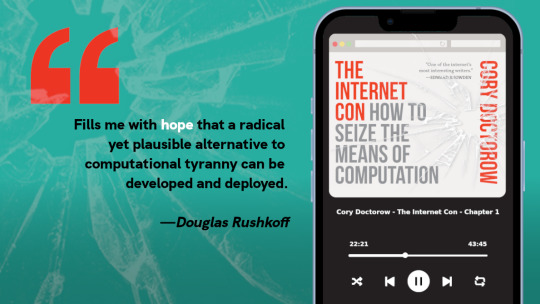
I'm kickstarting the audiobook for "The Internet Con: How To Seize the Means of Computation," a Big Tech disassembly manual to disenshittify the web and make a new, good internet to succeed the old, good internet. It's a DRM-free book, which means Audible won't carry it, so this crowdfunder is essential. Back now to get the audio, Verso hardcover and ebook:
http://seizethemeansofcomputation.org

If you'd like an essay-formatted version of this post to read or share, here's a link to it on pluralistic.net, my surveillance-free, ad-free, tracker-free blog:
https://pluralistic.net/2023/08/17/popular-front-of-judea/#speaking-frankly
#pluralistic#sy hersh#theories of change#third parties#us politics#thomas frank#unions#labor#organized labor#civil rights movement#black lives matter#dinos#entryism#occupy democrats
268 notes
·
View notes
Text
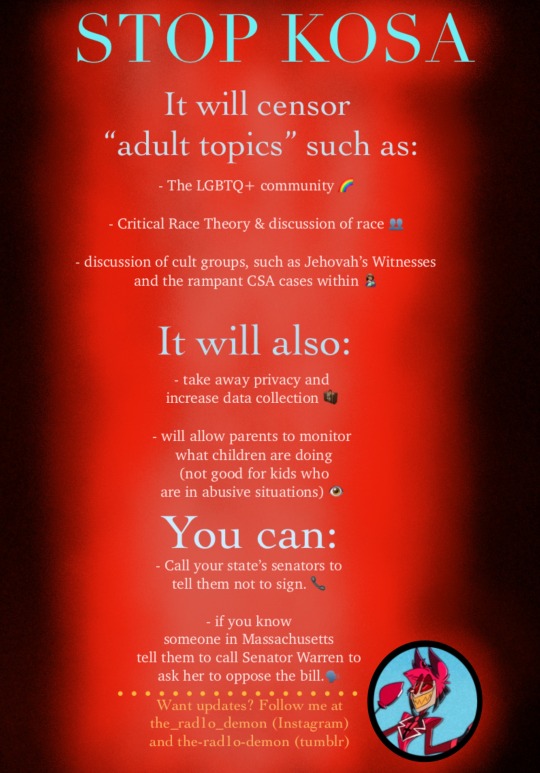
Image description by: @a-captions-blog
[Image description: An infographic about KOSA, a proposed United States law. Long description follows.
Pale blue text on a glowing red background reads:
Stop KOSA
It will censor “adult topics” such as:
- The LGBTQ+ community
- Critical Race Theory & discussions of race
- discussion of cult groups, such as Jehovah’s Witnesses and the rampant CSA cases within
It will also:
- take away privacy and increase data collection
- will allow parents to monitor what children are doing (not good for kids who are in abusive situations)
You can:
- call your state’s senators to tell them not to sign
- if you know someone in Massachusetts tell them to call Senator Warren to ask her to oppose the bill
Want updates? Follow me at the_radio_demon (Instagram) and the-rad1o-demon (tumblr).
In the corner is a bubble with Alastor from Hazbin Hotel. \End description]
Please do what you can to stop this bill from being passed, and please share this message where you can. It's going to be very bad for pretty much everyone on the Internet if this bill is passed.
If you're skeptical:
There are resources online with more information about the KOSA bill, including articles written by lawmakers explaining why this bill is a terrible idea.
There is even a TechDirt article written by Mike Masnick titled "Marsha Blackburn Makes It Clear: KOSA Is Designed To Silence Trans People" where they write of and post a video in which Senator Marsha Blackburn (who co-wrote the bill) explicitly stated that this bill would be used to target the trans community.
So please share this in your stories, with your family and friends, and call your Senators to tell them not to sign this bill. And if you know anyone in Massachusetts, tell them to call Senator Warren to ask her to withdraw her support of the bill.
Thank you for your time and consideration.
EDIT - UPDATE:
Please read the post I linked below, it pertains to the status of the KOSA bill. Things are not looking good right now.
UPDATE #2:
Please look at this post!
#lgbtqia#lgbt#lgbtqplus#lgbtq community#critical race theory#blacklivesmatter#black lives matter#ex jw#ex jehovah's witness#ex mormon#ex catholic#ex christian#ex cult#stop kosa#kosa bill#kosa act#kosa#kids online safety act#internet censorship#us politics
172 notes
·
View notes
Video
I am experiencing thoughts.
#god (hypothetical) ive seen what you can do for other people (in theory)#i am politely asking to get [redacted] by [redacted but you already know who]#tenoch huerta#tenoch huerta mejia#namor#namor the sub mariner#black panther#wakanda forever#bp2#black panther 2#bpwf#namor x shuri#mcu#marvel#thots are being had#send your prayers#adioooos#k'uk'ulkan
313 notes
·
View notes
Text
By: Yascha Mounk
Published: Oct 16, 2023
On October 7th, the world witnessed the worst slaughter of Jews since the Holocaust. Hundreds of attendees at a music festival were murdered in cold blood. Families hiding in their homes were burned alive. Jewish mothers and fathers were, in an eerie echo of the 1940s, imploring their children to stay quiet lest their would-be murderers should detect their whereabouts. Nearly two hundred people remain in the clutches of a terrorist organization that announced its genocidal intentions in its founding charter.
Many people, of all faiths and convictions, have recognized the enormity of these crimes. Numerous world leaders denounced the terrorist attacks in clear language. Private citizens shared their grief on social media. Millions mourned. But despite the outpouring of support, there has also been a large contingent of people and organizations who stayed uncharacteristically silent—or went so far as to celebrate the carnage.
Even as British Prime Minister Rishi Sunak found clear words about Hamas, for example, the BBC have steadfastly refused to call the Hamas fighters who killed over 1200 people by the name rightfully reserved for those who deliberately target innocent civilians for political ends: terrorists. Meanwhile, many schools and universities, nonprofit organizations and corporations that have over the past years gotten into the business of condemning and commemorating all kinds of tragedies, both small and large, fell uncharacteristically silent.
Some of the most famous universities in the world—including Princeton, Yale and Stanford—only released statements after they came under intense pressure on social media. At Harvard University, it took pressure from alumni and an outraged thread on X by Larry Summers, a former president of the institution, to prompt his successor into belated action.
Worse still were the people and organizations who actively celebrated the pogroms. Multiple chapters of the Democratic Socialists of America, which continues to count Alexandria Ocasio-Cortez among its ranks, encouraged their followers to attend rallies that glorified Hamas’ terror as a righteous form of resistance. As its San Francisco chapter wrote on X, the “weekend’s events” should be seen as part and parcel of Palestinians’ “right to resist.” The Chicago chapter of the Black Lives Matter movement even glorified the terrorists who murdered scores of people at a rave in southern Israel, pairing a now-deleted image of a paraglider with the caption: “I stand with Palestine.”
Meanwhile, academics from leading universities were busy defending these terrorist attacks as a form of anti-colonial struggle. “Postcolonial, anticolonial, and decolonial are not just words you heard in your EDI workshop,” a professor in the school of social work at McMaster University, in Canada, wrote on X. “Settlers are not civilians,” a Yale professor who has written for mainstream outlets including The Washington Post and The New York Times, maintained.
All of this raises a simple question: How could such a notable portion of the left side with terrorists who openly announce their genocidal intentions? Why have key institutions proven so reluctant to denounce one of the worst terrorist attacks in living memory? What, to them, renders the victims of these attacks so much less worthy of solidarity than those of the many other atrocities they have full-throatedly condemned?
The ideological roots of the great obfuscation
In the past days, people have offered many possible explanations for this selective silence. Some focus on outright antisemitism. Others emphasize that an understandable concern over the immoral actions that Israeli governments have taken in the past have blinded many activists to the suffering of innocent Israeli civilians. Others still point out that institutional leaders want to avoid eliciting angry reactions from activists, preferring to stay silent on a sensitive issue out of simple fear for their jobs.
Each of these explanations contains a grain of truth. Some people in the world really are consumed by one of the world’s most ancient hatreds. Others are indeed hyper-focused on everything that Israel has done wrong, a stance that is easier to understand in the case of Palestinians whose ancestors have been displaced than it is in the case of leftist activists who have for many decades found the missteps of the one state that happens to be Jewish worthy of much greater condemnation than similar, or greater, missteps perpetrated by any other. Finally, it is indeed true that many university presidents, nonprofit leaders and corporate CEOs have, among the institutional meltdowns of the past years, come to believe that they must avoid controversy at all costs if they are to keep drawing their generous paychecks.
But the double-standard that has in the past days become so obvious on parts of the left also has a more profound source, one that is ideological rather than practical or atavistic. Over the past decades, a new set of ideas about the role that identity does— and should—play in the world have transformed the very nature of what it means to be on the left, displacing an older set of universalist aspirations in the process.
This novel ideology, which I call the “identity synthesis,” insists that we must see the whole world through the prism of identity categories like race. It maintains that the key to understanding any political conflict is to conceive of it in terms of the power relations between different identity groups. It analyzes the nature of those power relations through a simplistic schema that, based on the North American experience, pits so-called whites against so-called “people of color.” Finally, it imposes that schema—in a fashion that might, in the academic jargon of the day, ironically be called “neo-colonial”—on complex conflicts in faraway lands.
The trouble with structural racism
Many advocates of the identity synthesis rightly point out that an account of racism which focuses purely on individual beliefs or motivations runs the danger of concealing important forms of injustice. Even if everyone has the best of intentions, the after effects of historical injustices can ensure that many immigrant students attend underfunded public schools or that many members of ethnic minorities suffer disadvantages in the housing market. It therefore makes sense, they argue, to add a new concept to our vocabulary: structural racism.
As the Cambridge Dictionary explains, structural racism consists of “laws, rules, or official policies in a society that result in and support a continued unfair advantage to some people and unfair or harmful treatment of others based on race.” By pointing out that some forms of racism are “structural” in this way, we are better able to capture—and hopefully remedy—circumstances in which members of some racial groups suffer significant disadvantages for reasons other than individual bias.
This is plausible insofar as it goes. To understand contemporary America, it is indeed helpful to add the notion of structural racism to our conceptual toolbox. But in recent years, many advocates of the identity synthesis have gone one step further: they have begun to claim that this more recent concept of structural racism should altogether supplant the older concept of individual racism.
Rather than acknowledging that there are two different conceptions of racism, each of which helps to elucidate real injustices in its own way, parts of the left have come to conceptualize racism in an exclusively structural form. “Racism,” one online guide puts the growing consensus, “is different from racial prejudice, hatred, or discrimination” because it must involve “one group having the power to carry out systematic discrimination through the institutional policies and practices of the society and by shaping the cultural beliefs and values that support those racist policies and practices.”
In its most radical form, this claim entails that it is impossible for a member of a historically marginalized group to be racist toward a member of a historically dominant group. Because racism does not have anything to do with individual beliefs or attributes, and members of groups that are comparatively powerless are incapable of carrying out “systematic discrimination” against members of groups that are comparatively powerful, even the vilest forms of hatred need not count as racist. As an article in Vice put it, “It’s literally impossible to be racist to a white person.”
The result has, again and again, been a form of selective blindness when members of minority groups have expressed bigoted attitudes toward supposedly more privileged groups, including those that are themselves minorities. This inability to recognize the importance of the more traditional conception of racism makes it impossible to name what is happening when members of one minority group are the victims of hate crimes committed by members of another minority group that is now considered to suffer from greater disadvantages. In December 2019, for example, two terrorists killed a police detective and then murdered three people at a kosher grocery store in Jersey City, close to New York. They had a long trail of posting antisemitic content on social media; one assailant was a follower of the Black Hebrew Israelites, a movement which holds overtly antisemitic beliefs. But because the assailants were black, and the victims perceived as white, many news outlets failed to categorize the shooting as racist, or to treat it as a hate crime, for an astoundingly long period of time.
The trouble with white privilege
The idea that all racism is structural is deeply damaging because it makes it hard for institutions to open their eyes to forms of discrimination towards members of groups that are supposedly dominant. In practice, it is made even worse by the fact that many people on the left have now embraced a very simplistic notion of who is dominant and who is marginalized—one that imposes American conceptions of race onto situations in which they distort rather than illuminate underlying realities.
In North America, the most salient—though by no means the only—racial divide has for centuries been that between whites and blacks. In assessing which group is supposedly privileged in a foreign conflict, many Americans therefore think it is enough to figure out who is “white” and who is a “person of color.” This makes it impossible for them to understand conflicts in which the relevant political cleavage does not neatly pit whites against blacks (or, more broadly, “whites” against “people of color”).
Whoopi Goldberg, for example, has repeatedly insisted that the Holocaust was “not about race.” Since, from an American point of view, both Jewish and non-Jewish Germans are white, she found it impossible to get her head around an ideology that centers around racial distinctions between them. “You could not tell a Jew on a street,” she wrongly claimed. “You could find me. You couldn’t find them.”
In the case of Israel, this has led most observers to assume that there is a clear division in racial roles between Israelis and Palestinians: In their mind, Israelis are white, Palestinians “people of color.” And since white people have historically held power over non-white people, this reinforces the impression that it is impossible for Israelis to be victims of racial hatred.
But this perspective once again turns out to be so simplistic as to verge on the delusional. Ms. Goldberg was wrong to believe that Nazis were unable to spot Jews; though some Jews did manage to survive by passing themselves off as “Aryan,” many Nazis—and their collaborators in Central Europe—were highly effective at spotting people whom they suspected of being Jewish.
More importantly, the assumption that most of the victims of last Saturday’s terrorist attacks were “white” Jews with roots in Europe is simply wrong. It’s not just that there are black Israeli Jews whose ancestors immigrated from Ethiopia, or that Hamas’ victims included many migrants from Thailand and Nepal; it’s also that Israel as a whole is now home to more Mizrahi Jews, who hail from the Middle East, than Ashkenazi Jews, whose ancestors long lived in Europe.
I will leave it up to others to speculate on whether the visual differences between Jewish and non-Jewish Germans are more or less stark than those between Arabs and Mizrahi Jews. But the prominence of Mizrahi Jews also betrays yet another way in which attempts to fit the Israel-Palestine conflict into a simplistic conceptual scheme go badly wrong.
The trouble with Decolonialism
The actual demographic composition of the country makes claims that Israeli civilians should be seen as settlers who are fair game for terrorist attacks doubly cynical. They are cynical because no political cause, however righteous, justifies the deliberate targeting of babies and grandmothers—neither on the Israeli nor on the Palestinian side. And they are also cynical because the great majority of Mizrahi Jews have, since the end of the Second World War, been violently displaced from the Middle Eastern countries in which their ancestors had lived for hundreds of years, with no country other than the world’s only Jewish state willing to offer them a safe harbor.
Postcolonial apologists for terrorist organizations like Hamas and Hezbollah love to invoke Frantz Fanon’s glorification of violence. The problem is not just that their tendentious reading of his work overlooks the ways in which violence can be morally corrosive and politically destructive; it’s also that the implied analogy between the so-called pied noirs (white settlers in Algeria who could safely return to the French metropolis if they chose to do so) and Mizrahi Jews (who would be neither welcome nor safe if they were to return to Iran or Iraq, to Morocco or Algeria) is so misleading as to be perverse.
And yet, this misleading analogy governs how many on the left ascribe the role of victim and perpetrator, explaining why dozens of student groups at Harvard could claim that Israel is somehow “entirely responsible” for Hamas’ decision to murder more than 1,000 civilians. At a deeper level, they even help to explain how left-wing activists and academics can contrive to perceive a deeply authoritarian and overtly theocratic regime that is explicitly hostile to sexual minorities as a progressive movement.
According to many progressives, what determines whether a movement should count as left-wing or right-wing is based on whether it claims to be fighting on behalf of those they believe to be marginalized. Since Hamas is an organization of underprivileged “people of color” fighting against “privileged” “white” Jews, it must be seen as part of a global struggle against oppression. Even though its program—which incidentally includes the violent suppression of sexual minorities within the Gaza strip—is reminiscent of some of the world’s most brutal far-right regimes, those marching in support of Hamas consider them to be part of the global struggle for progressive values. As Judith Butler, a central figure in this intellectual tradition, said in 2006, it is “very important” to classify both Hamas and Hezbollah as “social movements that are progressive, that are on the Left, that are part of a global Left.”
It’s time for a reckoning with bad ideas on the left
Over the past few days, some observers have started to recognize how badly parts of the left have gone astray. Many leftist academics were genuinely horrified to see their friends and colleagues celebrate the murder of babies. There has been widespread outrage at the decision of influential movements like Black Lives Matter to idolize terrorists. Shri Thanedar, a U.S. Congressman, has publicly renounced his membership in the DSA.
This is a good start. In a free country, anyone must be free to express their support of extremist organizations, however vile; the move by many European governments to suppress pro-Hamas protests or to jail those who glorify the terrorist attacks is a betrayal of the liberal principles on which our opposition to that execrable organization should be based. But mainstream institutions can and absolutely should stop uncritically embracing organizations, like BLM, that openly glorify terrorists. And citizens should demand that moderate political parties, like the Democrats, cease to tolerate in their midst members of organizations, like the DSA, that equivocate about the moral permissibility of mass murder.
Black lives matter, greatly. Colonialism remains one of the greatest historical injustices. Even before this week, though, it should have become clear that the recognition of these important facts is fully compatible with serious concerns about the organizations that now speak on behalf of the Black Lives Matter movement, and about a postcolonial discourse that all too often glorifies violent resistance to anybody who, however simplistically, is judged to be an “oppressor.”
Many advocates of the identity synthesis are genuinely motivated by good intentions. But key parts of this ideology now provide cover for forms of racism and dehumanization of vulnerable groups that should be anathema to anybody who genuinely cares about the historical values of the left. It is time for the many reasonable people who have bit their tongue as these ideas took on enormous power in mainstream institutions to raise their voice against them.
The suffering to come
Any humane outlook on the world must recognize that civilians never deserve to suffer due to the group into which they were born or because of actions committed by those who claim to speak on their behalf. I feel as much empathy for the Palestinian children who are dying in bombardments of Gaza as I do for the Jewish children who were killed in Hamas’ attack on Israel. Insinuations of collective responsibility are vile, even when voiced in response to a disgusting terrorist attack. Each civilian death is a tragedy on the same moral order.
While every civilian victim is in equal measure undeserving of their tragic fate, moral philosophers have for centuries recognized a key distinction governing the conduct of war. Military action that is directed against military targets may be legitimate; while some civilian deaths are foreseeable as a consequence of such attacks, soldiers must undertake to minimize them as far as possible. By contrast, military action is always illegitimate when the killing of innocents is the goal, not an unintended side effect.
This set of standards helps to explain how spectacularly Hamas, the organization that started the current war with a long-planned surprise attack that killed over a 1,000 men and women, toddlers and grandmothers, Ashkenazim and Mizrahim, Jews and non-Jews, Israelis and Thais and Americans and Canadians and Germans and Chinese, failed to obey the most basic moral rules. Now, it should also guide our assessment of Israel’s unfolding actions in Gaza.
This is a war Israel did not choose, and it has every right to defend itself. No democracy would tolerate on its borders the presence of a terrorist organization that has just demonstrated its willingness to engage in the indiscriminate slaughter of its civilian population; it would be the height of hypocrisy for people living in the safety of Berlin or Paris, of London or New York, to expect Israelis to do so.
But the military offensive against Hamas is extremely difficult because the terrorist organization has deliberately based so much of its military infrastructure in the midst of civilian settlements; because it is now doing what it can to stop its own people from moving away from military targets; and because Egypt, worried about the potential for Hamas fighters to destabilize the government or even perpetrate terrorist attacks within its own borders, has refused safe passage for most Gazans. All of this explains why it is so hard for Israel to accomplish its legitimate goals without causing numerous civilian casualties. But it does not constitute permission for Israel to adopt the logic of collective punishment by cutting off access to food and drinking water ahead of a full-scale invasion, or absolve the country’s armed forces from doing what they can to minimize the number of civilian casualties. As and when Israel fails to do so, full-throated criticism of its government is fully justified.
The left has the potential to speak powerfully to this moment. To do so, it needs to jettison the ideological jargon that has made so many supposed idealists fall for the ever-present temptation to contrive reasons why the suffering of one side is outrageous while the suffering of the other side is glorious. To retain our moral composure in the ugly days and weeks now on the horizon, we must recover a moral universalism that, even in the darkest hour, reminds us of our shared humanity—and unhesitatingly laments the death of innocents, irrespective of the group to which they belong.
Yascha Mounk is the founder and editor-in-chief of Persuasion. His latest book is The Identity Trap: A Story of Ideas And Power In Our Time.
#Yascha Mounk#antisemitism#identity synthesis#identity politics#Israel#Palestine#hamas#islamic terrorism#islam#islamic violence#intersectionality#BLM#Black Lives Matter#decolonization#postcolonial theory#religion is a mental illness
29 notes
·
View notes
Text
in s3e4, when silver is taken from the cages to speak to madi, he says he has 2 dozen men in cages (4 having been killed already) ... granted this is post-becalming and 2 men were killed there. flint kills one man in the storm when he cuts free the fore topgallant. one guy goes falls into the ocean when billy and the others on the yards when they get dunked. and muldoon dies. so that puts us at a conservative estimate of 34 walrusmen ± 3 if you think silver included himself, billy, and flint in his estimate of the men in the cages. which doesnt seem to be NEARLY enough for a ship of that size. the walrus is a fully rigged barque from what i can tell - triple masted, square rigged, with the mizzenmast partly fore-and-aft rigged. the wiki lists the walrus as having 60-70 men which makes more sense, but pirate crews were noted to have an excess of men to reduce work (compared to the navy, where ships would only be manned w necessary numbers of men). i guess they could have managed thru the storm w only ~35 men? more may have died offscreen from the storm or starved i suppose
#i just love logistics! also very happy to have figured out the walrus is a barque ^_^#canis watches black sails#black sails#anyways. more to my theory that the walrus is actually kind of terribly run OR all the coolfun ship politics are offscreen#making a walrusman oc whos a very beleagured master carpenter who hates flint for never lettign them stop for repairs#he and degroot get drunk together and bitch abt flint w dusfrene
13 notes
·
View notes
Text
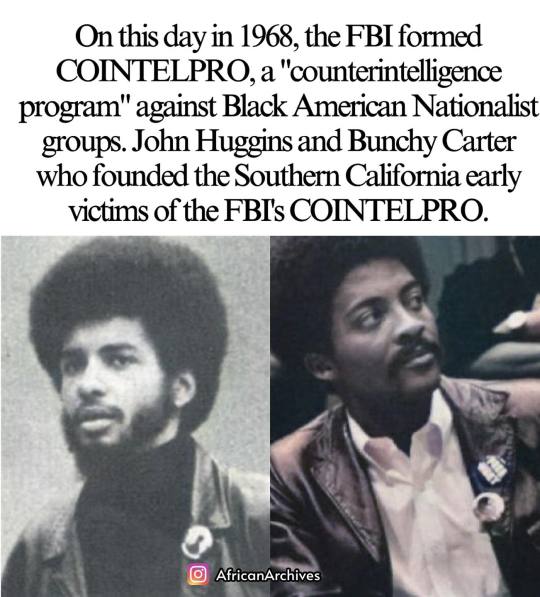
An FBI memo dated November 29, 1968 described a letter that the L.A FBI office intended to mail to the Black Panther Party office. The letter. was made to appear as if it had come from the Us Organization, describing fictitious plans by Us to ambush BPP. The FBI memo stated that "It is hoped this counterintelligence measure will result in an 'Us' and BPP vendetta."
—At a Black Student Union meeting at UCLA's Campbell Hall on January 17, 1969, Bunchy and John, another BPP member, were heard making derogatory comments about Karenga, the founder of Organization Us. Other versions mention a heated argument between Organization Us members and Panther Elaine Brown. An altercation ensued during which Carter and Huggins were shot to death. BPP members originally insisted that the event was a planned assassination, claiming that there was a prior agreement that no guns would be brought to the meeting, that BPP members were not armed, and that Organization Us members were.
Organization Us members maintained the meeting was a spontaneous event. Former BPP deputy minister of defense Geronimo Pratt, Carter’s head of security at the time, later stated that rather than a conspiracy, the UCLA incident was a spontaneous shootout. The person who allegedly shot Carter and Huggins, Claude Hubert, was never found.
During the Church Committee hearings in 1975, evidence came to light that under the COINTELPRO actions, FBI agents had deliberately fanned flames of division and enmity between the BPP and Org US. Death threats and humiliating cartoons created by the FBI were sent to each group, made to look as if they originated with the other group, with the explicit intention of inciting deadly violence
Following the UCLA incident, brothers George and Larry Stiner and Donald Hawkins turned themselves in to the police, who had issued warrants for their arrests. They were convicted for conspiracy to commit murder and two counts of second-degree murder, based on testimony given by BPP members. The Stiner brothers both received life sentences and Hawkins served time in California’s Youth Authority Detention.
#COINTELPRO#FBI manipulation#Black Panther Party#Organization Us#UCLA incident#political assassinations#racial tensions#government surveillance#counterintelligence operations#Church Committee hearings#law enforcement misconduct#conspiracy theories#historical injustice#racism#white supremacy
10 notes
·
View notes
Text
I am not inclined to lament Wynter’s unattributed contributions to political theory, since much of what motivates such an inclusion is a desire to address the pitfalls of normative disciplines so that their presence and lifespan is made more durable. It is not necessarily the exclusion of Wynter and other “tremulous” thinkers that impoverishes political theory as a site of contemplation, but rather it is the desire to incorporate such thinkers and delink them from their own intellectual lineages—a harvesting of brilliant Black minds—so that the discipline might live to see another day. This would be contrary to Wynter’s commitment to discarding disciplinary allegiance(s).
Alagraa, Bedour. "Review Essay: The Underlife of the Dialectic: Sylvia Wynter on Autopoeisis and Epistemic Rupture." (2023): 279-286.
#bedour alagraa#sylvia wynter#ellis reads#black philosophy#political theory#this is SO well put#not finished reading this essay yet but so far it is excellent
13 notes
·
View notes
Text
I don’t think you truly understand how BAD Mrs. Maas’s fantasy books and the booktok copycats she spawned are until after you’ve broken out of that bubble. I genuinely enjoyed how unique Nobody’s Goddess was along with Noll being a refreshing protagonist, am living it up with The Promise of Aferi: The Wolf Queen Book 2, and I can’t wait for Beasts of Prey. Like I forgot how genuinely GOOD fantasy can be.
#I’m reading a mix of political theory and fantasy books to balance each other out (yes I am FINALLY finishing Discourse on colonialism)#But anyway the difference between these fantasy books and Maas’s is JARRING#Ofc my running theory is that with all of my current and tbr fantasy books having Black protagonists the standards are higher#so they have to be written better to even be allowed a chance in the white dominated publishing market#bookish rambles#Sometimes I think about Feylin's potential in the hands of another author#and I weep
28 notes
·
View notes
Text
‘Re that “pretty privilege” tweet.
All significant studies point to women (especially, but really all people) who are less desirable (especially the disabled) suffering a greater chance of sexual violence. That violence is also often more severe. So when people suggest being desirable means being in greater proximity to sexual violence, this erases what has been known about desirability for quite some time. While being desirable doesn’t shield you from sexual violence directly, it DOES position you further from that which makes you more vulnerable. You tend to have greater job access, earn more at those jobs, have safer housing conditions….etc.
Victims are absolutely made into liars but desirable people are believed more. That matters.
Victims often do not survive, but desirable people survive more. That absolutely matters.
Victims are often forgotten, but desirable people are remembered more.”
^^^^ more away from “pretty privilege” and let’s center “the power one has through desirability politics (which is defined by various forms of anti-Blackness)”
&
“yeah, there's an extra level of "your body doesn't belong to you" when you're undesirable (i.e. disabled). you're hated and you're simultaneously taken advantage of/used in any way people (abusers) want precisely because people don't care about you. ask me how i know!”
105 notes
·
View notes
Text
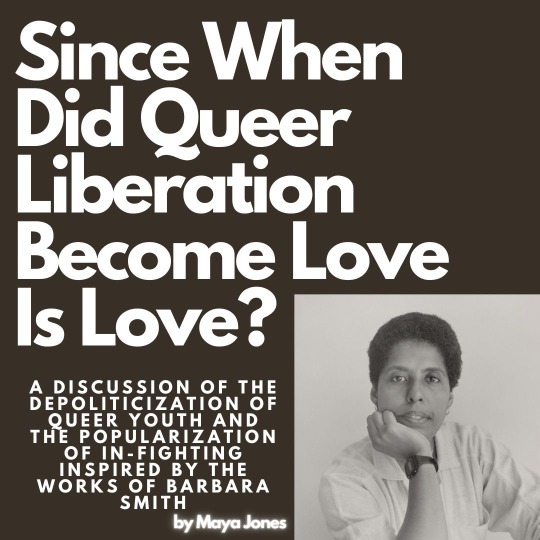
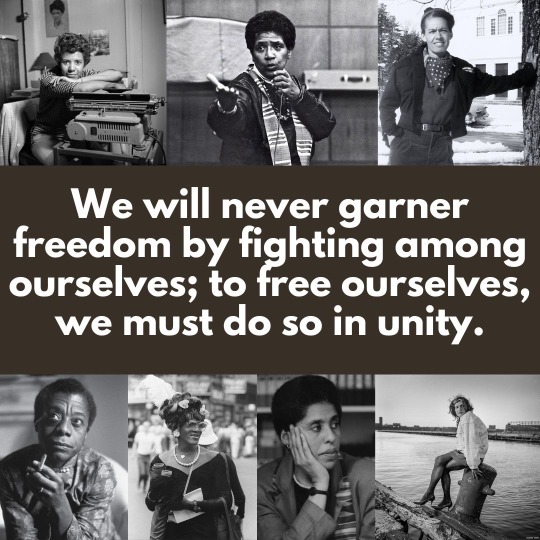
Why are we so focused on what pronouns lesbians can use?
Why are we concerned about which LGBTQ person can use which slur in reclamation?
Why do we decide the passability of transgender individuals and whether or not they are “valid”?
Why tip-toe around politics of respect, when queerness in itself questions respectability?
Why have queer individuals begun to police the definition of queerness for each other?
Since when did “queer liberation” become “love is love”?
Discourse is defined by Cambridge Dictionary as “discussion or debate” or a “formal or political argument”; this is the basis of the concept of queer discourse (Discourse, n.d.). When the LGBTQ community is pitted against each other in the debate regarding queer issues, division is created that imposes cisheteronormative and patriarchal beliefs in our community. This polarizing debate that causes division amongst queer youth tends to focus on widely debated topics such as neopronouns, gender roles in relationships, dysphoria, detransitioners, and countless others. These debates — referred to as queer discourse — commonly warp queer perspectives into being focused on inter-community disagreements instead of social change that can be made to better the livelihoods of LGBTQ youth and adults, such as transgender-affirming healthcare, protections against hate-based violence, LGBTQ-inclusive school policy, etc. Onenten is a nonprofit organization that shares the idea that the popularization of queer discourse is reductive and a step backward for the community. “This warped version of discourse aims to further divide an already fractured community. When large groups of LGBTQ+ publicly dismiss the validity of sub-categories that exist within our community, our focus is shifted from gaining total acceptance and liberation to infighting and identity-policing. This leaves vulnerable youth susceptible to indoctrination into exclusionary ideologies that pit them against members of their own community” (Swaffar, 2021). In light of the obsession that queer youth have developed towards discourse and identity politics, I think it is important to address the ongoing sense of apathy within spaces of young LGBTQ people toward revolutionary politics.
As Generation Z has lived through the legalization of gay marriage throughout the United States, many of this generation’s queer folks no longer see the inherent political stance that being queer takes. Furthermore, I think community values – such as solidarity between community members, unconditional support of transgender joy, and motivation to improve the world for the next generation of queer people to come, etc – have been lost. I believe this is a uniquely troublesome issue amongst Generation Z because many of us see the legalization of same-sex marriage to be the end goal of queer liberation, which is a false understanding of what it means to liberate a marginalized community. Brittanica defines the Gay Rights Movement as the movement advocating for equal rights of LGBTQ persons; eliminating sodomy laws and ending discriminatory practices in employment, credit, housing, public accommodations, and other areas are described as goals of the movement. The manifestation of this goal – the goal to create social, economic, and political equality for LGBTQ people – can be understood as queer liberation.
I believe controversy and discourse amongst young queer people have become reductive in a way that promotes patriarchal and cisheteronormative ideas instead of promoting queer liberation. In my research, I wish to explore this acquired sense of apathy that young generations of LGBTQ individuals have upheld since the 2010s and to dismantle this idea of respectability and apathy towards revolution that is so deeply ingrained in young queer people's politics.
I attribute much of the apathy within Generation Z’s queer community regarding radical politics to the popularization of respectability politics within the queer community. Respectability politics is a concept – described by Evelyn Brooks Higginbotham in her work Righteous Discontent – when marginalized individuals conform to societal expectations to garner better treatment from oppressive institutions (Higginbotham, 2003.) Imploring respectability politics in a queer context is to humanize LGBTQ people by creating an adjacency from cisheterosexuality to queerness. A prime example of the rise in respectability politics within the LGBTQ community is the popularization of the phrase “love is love”, as opposed to the sentiment of queer liberation. The strategy of employing the phrase “love is love” was to ask cisheterosexual people to see queer people's humanity because, underneath our queerness, we are all the same. I see this to be a falsehood. Equating the life and experiences of cisheterosexual individuals to that of queer individuals, due to our shared trait of being human, is to ignore the differences in our lives due to systemic oppression. We may share humanity, but we do not share experiences of oppression in the same way. To ignore our differences is to manipulate the cultural consciousness into believing that queer folks are simply the same as cisheterosexuals when we truly are both different in our lifestyles, values, culture, and inherent identities. These differences do not dictate that we should be treated differently, or with less respect; these differences are important and should be acknowledged instead of ignored. Ignoring our differences is to say “I don’t see color” and while that statement does not provide an exemption from negative racial implications, neither does “love is love” avoid any implications of homophobia and sexual orientation-based discrimination that may be expressed. The sentiment of love simply being love has been adopted by many since gay marriage has been legalized, and I believe this to be an acceptance of an unfair compromise given to us by the United States government to appease our desire for liberation. This acceptance only furthers the adoption of cisheteronormative ideals into the queer community, which explains why Generation Z has been weaponizing tradition against each other so often.
To give some historical background, a large obstacle for proponents of same-sex marriage legalization was the Defense Of Marriage Act (DOMA) in 1996, which federally defines marriage as being between one man and one woman. The purpose of the DOMA was to serve as a political and social statement that affirmed the traditional understanding of marriage as being between cisheterosexuals, reflected opposition towards the same-sex marriage movement, and sought to preserve the “sanctity of marriage” for heterosexual couples alone. The first state to legalize civil unions for same-sex couples was Vermont in the year 2000. Thirteen years later, the Supreme Court struck down a key provision of the DOMA in the United States V. Windsor, which granted federal recognition to same-sex marriages performed in the states in which it is legal. Two years later, in Obergefell V. Hodges, the Supreme Court ruled that same-sex marriage was a constitutional right and legalized it amongst all states nationwide.
Many queer scholars see the legalization of same-sex marriage as a compromise between the freedoms needed by queer individuals, and the freedoms that the American government was willing to give us. This compromise has been deemed reductive given the depoliticization that took place after the legalization of gay marriage has only furthered complacency from LGBTQ allies and apathy within the LGBTQ community towards our own liberation. This is not to diminish the importance of same-sex marriage legalization as a step towards legal rights for LGBTQ individuals but to stress the political implications of this decision. Conflating queer liberation and marriage equality is a false equivalency that devalues movements of social justice that seek to transform the oppressive institutions within society. Same-sex marriage was one step towards queer liberation, but to say as queer activists that we have met our goal is to misunderstand the systems of oppression that queer people live within. Many more issues exist beyond same-sex marriage for queer individuals. Access to healthcare for trans people, protections against discriminatory practices, legal protections against identity-based violence, and acknowledgment of queer history within the school curriculum: these are ongoing struggles faced by members of the LGBTQ community. To ignore the importance of these persistent issues is to settle for same-sex marriage. As a marginalized community with so much organizational power, and motive to advocate for universal freedoms, we should never settle for less than our freedom.
As many of Generation Z have been raised to think that same-sex marriage was the end-all-be-all of queer liberation, many folks within the community have lost their political consciousness and motivation for revolution. Instead, we focus on policing each other’s tone and identity, by discussing trivial and redundant points which have been repeated throughout the 2010s in online spaces. These conversations of slur discourse, respectability, and validity only create further division between LGBTQ young people, when we could be having conversations about how to better understand each other and fight for each other’s rights. Accepting the idea that we have achieved our goal for LGBTQ liberation gives queer young people the reductive idea that in-fighting is important when it only deters the movement. I believe this deterrence is strategically implemented by cisheteronormative society. As Barbara Smith, prolific queer scholar, states: “Given how well organized the Christian right is, and that one of its favorite tactics is pitting various oppressed groups against one another, it is past time for straight and gay activists to link issues and work together with respect.” (Smith, 1998.) To devalue our differences is only to devalue the importance of our unity, both within the LGBTQ community, and our cisheterosexual counterparts.
While this might seem like a new issue, there has always been in-fighting within the LGBTQ community from the beginning of the movement. As transgender women of color who experience marginalization beyond that of their white, cisgender counterparts, Marsha P. Johnson and Sylvia Rivera were changemakers and innovative activists at the forefront of the movement for gay and lesbian rights, they were not treated with the utmost respect within the community by people who did not identify as transgender themselves. Needless to say, the LGBTQ community is not united between all of the identities within the acronym, as these identities are unique to each individual. To assume all LGBTQ individuals understand and relate to the lived experiences of their fellow queer person is to assume a monolithic experience of queerness. Transgender individuals endure different systems of oppression than their cisgender, queer colleagues. Additionally, Black queer individuals experience intersecting systems of oppression that are different from the oppression white queer folks face. These differences in experience and marginalization, create diverse outlooks on queer discourse that often conflict. Cisheteronormative society often assumes queer individuals are all united in their values, which is a mistake that often leads to further separate us. Those of us within the community who don’t understand these differences ostracize folks who are further marginalized, this includes Black queer individuals, individuals of color in general, transgender individuals, and especially transgender women of color. This is reflected in the work, #HashtagActivism, which states that: “In fact, Sylvia Rivera, founding member of some of the first gay and trans liberation organizations in America, was once similarly booed and chastised for speaking to the concerns of trans women of color at a pride rally in 1973, only a few short years after her pivotal role in starting the LGBTQ movement.” (Jackson et al., 2020). This shows that the assumed solidarity between queer individuals is often not employed in the way that we need it. How can we achieve liberation if we don’t have each other’s backs? When heteronormative society places queer individuals in opposition to normalcy, we must seek solace among ourselves. As I see it, young queer people are not being taught to uphold this value of solidarity within the community, which only leads to further loneliness and isolation. We will never achieve liberation by refusing to look at our past. At the current moment, efforts are being made throughout the United States to censor school curriculums and protect children from learning about race, gender identity, and sexuality. Just since January 2021, forty-four states have taken steps to restrict the teaching of critical race theory or limit how teachers can discuss racism and sexism within their classrooms. Eighteen states have imposed these educational bans and restrictions either through legislation or other ways (Schwartz, 2021). In February 2021, a Florida committee advanced a bill that would restrict discussions of sexual orientation and gender identity in classrooms. More states since have followed in Florida’s footsteps in implementing restrictions on queer topics being discussed in school, which causes growing concern for the freedom of speech for queer youth within these schools (Thoreson, 2022). In light of this censorship, we must encourage our youth to be educated about social systems of oppression. We must look to our queer elders and queer scholars of the past to achieve the future which they desperately wanted for us. If we want the next generation of queer individuals to liberate themselves from this apathetic attitude towards revolution, we need to emphasize the importance of activism within the community instead of inter-community fights and puritanical ideas of conformity that queer discourse promotes.
As stated by Barbara Smith, “Gay rights are not enough for me, and I doubt that they’re enough for most of us. Frankly, I want the same thing now that I did thirty years ago when I joined the civil rights movement and twenty years ago when I joined the women’s movement, came out and felt more alive than I ever dreamed possible: freedom” (Smith, 1998). How will we achieve true freedom without acknowledging the differences in our love, lives, and oppression? Community values should always be of importance, but at the moment, they are hard to find. Discourse, online arguments, divisive propaganda, inter-community conflict, respectability politics, and tone policing are hindrances to LGBTQ liberation. We will never garner freedom by fighting among ourselves; to free ourselves, we must do so in unity.
#queer theory#queer discourse#generation z#respectability politics#queer liberation#love is love#solidarity#black lesbian
2 notes
·
View notes
Text
I have been very critical at the way that media has helped legitimize what essentially is a propaganda campaign. We need to call that what it is.
We know the actors. The actors are very explicit. They don't camouflage what they're doing.
In fact, one of the biggest actors, of course, Chris Rufo, regularly goes on Twitter and says, this is what we're going to do. He said he was going to turn critical race theory into a term that made white Americans think about indoctrination, their white children being treated as the oppressor. I mean, he lays it out, and then he lays out his strategy, which is we keep pushing this until we get some mainstream media to pick it up, and then the rest of mainstream media feels that they have to now pick it up or it will look like they're being biased.
So these folks have studied, I think, really the flaws in media and have exploited it. So what happens is this desire to be ‘balanced’ then actually means we obfuscate the truth.
The first thing we should have done as journalists is said, okay, show me in a classroom where this is happening.
Provide evidence that this is happening.
Let's define what Critical Race Theory is, and what it isn't.
And instead, we allowed bad faith actors to really define the terms in a way that I think has been very harmful because that's how propaganda works.
Attempted bans were against 1619 specifically. Then they came back with critical race theory. Now, of course, they're coming back with DEI and we just keep making kind of those same mistakes again and again.
I also just want to add that when we think about something like critical race theory, when we think about what should and shouldn't be taught in the classroom, part of what we did as a failure media is to ask what is the role of an education? And is it wrong to teach a theory? Is it wrong to teach things that every parent wouldn't agree with?
I mean, that is actually the role of an education.
—Nikole Hannah-Jones: The Attack on Black History
#politics#republicans#education#racism deniers#nikole hannah jones#erasure#diversity equity and inclusion#d.e.i.#racism#anti blackness#white supremacy#white fragility#media bias#1619 project#journalism fail#book bans#book banning#white grievance#white guilt#whitewashing history#aversive racism#colorblind racism#revisionist history#rightwing propaganda#crt#critical race theory
35 notes
·
View notes
Text
that pipeline of anti-intellectualism to the worst/most lukewarm political opinions on leftist politics. like actually maybe you guys should know a little bit about what you're talking about and then you won't sound so foolish or have to constantly reinvent theory & discourse that was already covered extensively in the 20th century
#so many people are just doing 2nd wave feminism and don't even know it because#when they say theory should be easily accessible what they mean is i refuse to seek out knowledge of the hard work done before me#and if i don't stumble across it in my day to day life then it doesn't exist#same thing with a lot of other leftist political topics. i see so many people going hey guys i think i cracked the case/connected something#new#especially when it comes to racial capitalism and the black radical tradition#like actually you're not saying anything new maybe you should read some cedric robinson walter rodney du bois angela davis fanon audre lord#like. it's better to have a common foundation to work from instead of constantly trying to reinvent the wheel!#and sometimes theory is tough to get through but that's why you discuss it with other people. it's important!#important things aren't always easily digestible & shouldn't be#black marxism for instance is dense but foundational!!!! as foundational as marx himself!!!#not that u guys have read marx either#anyway <3
7 notes
·
View notes
Text
whenever i see a post like “treating all feminism like terf blah whatever is exactly what terfs want yadda yadda” i’m sorry i can’t help but think God you sound so deranged. sorry LMAO
#the terf cabal this is their plan for the new world order#but in seriousness i feel MOST of these posts are either by people who mean well or radical feminist-adjacent women who are tired of being#harassed and i get it#but also some of these people who are obsessed with ‘terf’ and anti ‘radfem’ shit….are just sexists lol#they are antifeminist and thats their guiding principle and they need to own that#rather than blaming somebody else#many elements of queer theory or other postmodernist social justice is actually designed to be oppositional to feminism#in the same way the new left was in parts oppositional to the old#and the same way that the caste school of race is oppositional to marxism and internationalism and the like#the same way neoliberal and liberal multiculturalism is in opposition to political blackness and the rainbow coalition#like they are built as opposing ideologies by design#it’s fine to address it as such#necessary actually#its a specific political position with specific goals and guiding principles#not morals dictated by God or whatever like people pretend lol
27 notes
·
View notes
Text
Anyway it looks like Neo is going the “Get worse” route so uh, hope she has fun with that!! I rlly think she will stay in the Ever After like some people were suggesting. Whatever lessons our girls learn here, she will not be able to.
as for the other villains…
Mercury will probably get a redemption arc of some shape or form, or at least a “stop actively being garbage” arc. I think he’s been getting uncomfortable with things for a bit now, even if he doesn’t want to admit it, and has had the revelation of Salem’s motives. Plus, Emerald has defected, and she’s about the only person Mercury has any sort of real care for. Hazel is dead, he doesn’t like Cinder, and now he’s in a road trip with Tyrian who freaks him out. It might take some time but I think he will at least leave the bad guys.
Tyrian… I would be surprised if he makes it. The guy is utterly devoted to violence and chaos and to that end, Salem. He escaped before through maiming Qrow and Clover, but his luck might just run out. I simply can’t see him getting a redemption arc and growing into a better mindset though, haha
Cinder… it depends. I think she could very well get worse. But as far as I know, she is the only remaining member of Salems crew who doesn’t know her true motives. If she finds that out it could change things. If she does die, I don’t know, I don’t want it to be by Salem, though it could work as a tragic foil to Emerald, Blake, Weiss (and potentially Mercury) being able to escape their abusive environment and she cannot. I don’t like Cinder as a person but I’m curious to see where her character might go.
and Salem herself… I think it seems likely that she will end the series finally achieving peace in death, but hopefully without taking the planet with her. How she would get there remains to be seen considering how long she’s been around, but she can’t be killed conventionally. I mean, in the flashback she and others tried, and present day she fought through a bomb to the gut and caved in skull. So there will be no victory in strength over her!
#RWBY#rwby theory#rwby neopolitan#mercury black#cinder fall#tyrian callows#rwby salem#This isn’t a discourse invite just my own personal thoughts pls pls pls no discourse#If you want a civil discussion or to politely share your own thoughts that’s fine though#rwby volume 9 spoilers#For Neo
15 notes
·
View notes